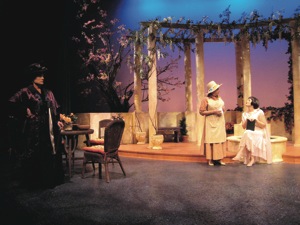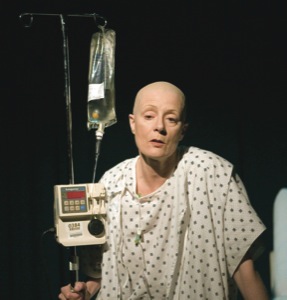-
- Washington Governor signs domestic partnership measure into law
- AIDS advocates lobby Capitol Hill for HIV funding
- New York Gov. Spitzer to press ahead on same-sex marriage bill
- Intolerance of student’s ‘tolerance’ column puts teacher’s job on the line
- U.S. transgender student misses title as prom king
- Bay Area doctors promote Pap tests for gay men to combat cancer
- National News Briefs
- World News Briefs
Arts & Entertainment
Of life, death and war
'Enchanted April', 'Wit' and 'Oresteia' reviewed
Published Thursday, 26-Apr-2007 in issue 1009
Enchanted April
Everybody needs a little enchantment, especially those suffering through yet another cold and rainy spell in England. And where better than sunny Italy?
Matthew Barber’s adaptation of Elizabeth Von Arnim’s novel Enchanted April plays through May 13 at Lamb’s Players Theatre in Coronado, directed by Deborah Gilmour Smyth.
Lotty Wilton (Kerry Meads), a somewhat dowdy London housewife longing for escape and adventure, happens upon an ad in the paper addressed “to those who appreciate wisteria and sunshine.” The ad offers to rent an Italian villa for the month of April, complete with kitchen staff and views of the sea.
Lotty is so taken that she rather brazenly accosts the unknown woman sitting nearest her in the ladies’ club, one Rose Arnott (Ayla Yarkut), a straight-laced housewife who looks “like a disappointed Madonna.” Rose’s husband Frederick (David Cochran Heath) writes novels Rose considers too racy; the resulting estrangement in their relationship makes it easy for Lotty to convince her to go. Lotty’s stodgy husband Mellersh (Ron Choularton) registers disappointment when she announces her plan, but does not try to stop her.
The foursome is completed by starchy old grande dame Mrs. Graves (D’Ann Paton) and the young, lovely and sexy Lady Caroline (Erin Byron). Mrs. Graves is horrified by the forwardness of Lady Caroline, and by what she regards as the silly behavior of Lotty and Rose. Nonetheless, the power of wisteria and warmth, sun and sea work their magic on all four women. Romance is in the air; Lotty and Rose even invite their husbands to the villa.
Lamb’s has another lovely production to its credit, due in no small part to Shon Leblanc’s spectacular costumes (especially for Lady Caroline), Mike Buckley’s sunny, wisteria-laden villa set and fine acting all around, including good turns by Jason Heil and Rhona Gold as the owner of the villa and the housekeeper.
Do sun, sea and wisteria change things as much as Enchanted April would have us believe? Maybe, maybe not, but that’s the magic of Italy, and of theater.
Enchanted April plays through May 13 at Lamb’s Players Theatre. Shows Tuesday through Thursday at 7:30 p.m.; Friday and Saturday at 8 p.m.; matinees Saturday at 4 p.m. and Sunday at 2 p.m. For tickets, call 619-437-0600 or visit www.lambsplayers.org.
Wit
It’s tough to be witty about impending death – especially one’s own – but Vivian Bearing, Ph.D., (Rosina Reynolds) tries.
Professor of 17th century poetry with a specialization in the “Holy Sonnets” of John Donne, Vivian reacts to the doctor’s diagnosis (stage four metastatic ovarian cancer) with intellectual distance, pondering his use of the words “insidious” and “pernicious.” But when the fact sinks in, she agrees to an experimental series of eight-month-long rounds of heavy chemotherapy that will certainly knock her flat and may or may not help the condition. It is treatment Dr. Kelekian (John Herzog) does not expect her to survive.
As if being in God’s waiting room weren’t enough, Vivian is mortified to find she must submit to the prodding and questioning of former student Dr. Jason Posner (Dennis Henry), now Kelekian’s fellow. There’s little more embarrassing than revealing all to a former student. Posner remembers the class well, offering this opinion of Donne: “Your whole brain had to be in knots to get it. This guy makes Shakespeare sound like a Hallmark card.”
Margaret Edson’s Pulitzer Prize-winning Wit plays through May 13 at North Coast Repertory Theatre, directed by David Hay.
Jumping back and forth in time, Wit shows Vivian terrorizing students in the classroom, being terrorized by mentor E.M. Ashford (Sandra Eagye), dealing with squads of medical personnel including nurse Susie Monahan (Nanci Burrows), finding parallels between Donne’s writings and her situation. It becomes clear that Vivian has pursued her academic career at the expense of personal relationships.
Although she interacts in familiar and sometimes horrifying ways with medical staff and Ashford, Wit is about Vivian’s journey, and it is Reynolds (with shaved head) who must carry this 90-minute show. She does it with seeming ease; it is the audience that feels increasingly uncomfortable as her signature take-charge demeanor slowly crumbles under the indignities of hospital gowns, invasive tests, nosy questions, exhausting medicines and the ravages of disease, until finally she admits: “I’m scared. I want to curl up in a ball.”
There is no question how this will end (Vivian tells you at the beginning), but I doubt there was a dry eye in the crowd, especially at what she calls her last coherent line, “It came so quickly after taking so long.”
This is a bravura performance from Reynolds in a stunning if squirm-inducing production. But it is good to have this example of a strong woman who will not “go gentle into that good night.”
Wit plays through May 13 at North Coast Repertory Theatre. Shows Thursday through Saturday at 8 p.m.; Sunday at 2 and 7 p.m. For tickets, call 858-481-1055 or visit www.northcoastrep.org.
Oresteia
The Greeks didn’t invent warfare, but they sure got into a passel of armed encounters. One of the dumbest was the senseless 10-year war with Troy over the slutty Helen, which killed and wounded thousands and reminded everyone that violence is a poor way to solve disputes.
Aeschylus’ trilogy Oresteia takes the Trojan War as background for a consideration of the social costs of war and personal retribution, the relationship between man and the gods and the best way to create a just society.
The end of war brings the wounded warriors home in Agamemnon. Revenge killings devastate Agamemnon’s family in The Lantern Bearers. Finally, in Eumenides, Aeschylus proposes the establishment of courts of justice to peaceably adjudicate disputes.
Aeschylus uses the house of Atreus to illustrate his points. Agamemnon, Clytemnestra and Orestes all will have blood on their hands by night’s end, but though their actions are barbaric, judgment of them is difficult because each has a defensible reason. Clytemnestra, for example, can be applauded for killing her daughter’s killer (Agamemnon) but must be condemned for killing her husband.
Marianne McDonald’s modern translation is interpreted fairly traditionally in Agamemnon. In The Lantern Bearers and even more so in Eumenides, Lay pushes into the realm of the weird with monster movie-look costumes and strange music (with often incomprehensible lyrics) by Leigh Scarritt. There’s a certain Brechtian truth to this, but after a while one does wonder what one is watching.
Nonetheless, some fine acting is on display, notably from Monique Gaffney as both Cassandra and Athena, Sylvia Enrique as Clytemnestra, Tiffany Jane as Electra and Joshua Zar as Orestes.
The Greeks have a thing or two to teach us about solving disputes. When will we listen?
Oresteia plays through May 13 at 6th@Penn Theatre. Shows Thursday through Saturday at 8 p.m.; Sunday at 2 p.m. For tickets, call 619-688-9210 or visit www.6thatpenn.com.
|
|
Copyright © 2003-2025 Uptown Publications



